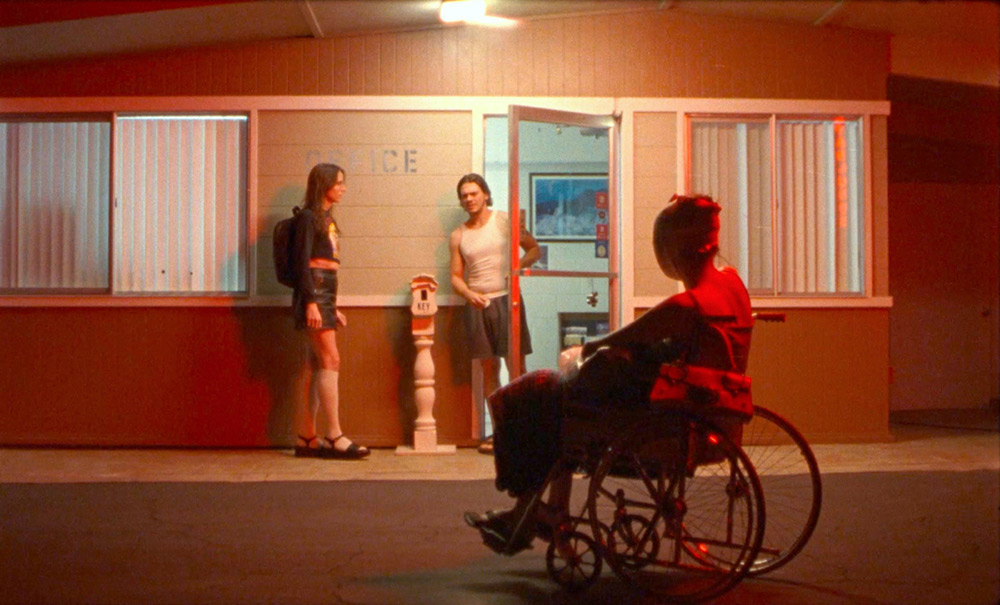Over the past eight years, with intermittent hiatuses, film artists Joey Carducci and Angelo Madsen have shepherded Anthology Film Archives’ series “The Cinema of Gender Transgression.” Its welcome return quickly reminded me what a formative influence and communal balm it has been for New York’s trans filmgoing cohort over the last decade. Carducci and Madsen craft a consistently venerable program that is part repertory series and part contemporary overview including sly investigations into more mainstream works that may not seem so outwardly queer. The canonical, the overlooked, and the contemporaneous are given equal weight. Conversing across history is rich thematic material in queer film works, as demonstrated in both the juxtapositions of the series’ programming, and the films themselves.
Hazel Katz’s Baby Sis (2022), which plays in the series’ overview of the Los Angeles-based moving image artist’s work, immediately opens this portal between tenses. Baby Sis is a single-screen iteration of Katz’s travelling installation Sulka’s Daughters, a warm, eulogic family reunion between the trans viewer and the trans pornographic performer Sulka, who found success in the first half of the ‘80s due to her collaborations with filmmaker and Female Mimics International (“the original magazine for men who enjoy dressing like women!”) editor Kim Christy. There’s been an uptick in critical and curatorial reconsideration of film works like Christy and Sulka’s of late, largely due to the tireless scholarship and programming of Elizabeth Purchell, who played a print of the duo’s 1984 comedy Sulka’s Daughter (in which Sulka, post-op, has literally given birth) at Nitehawk Williamsburg in June. This made entering into Katz’s examination of Sulka all the more intriguing. Katz presents Sulka as both maternal and unknowing. Shots of a solitary Sulka from her first feature with Christy, 1980’s Dream Lovers, are accompanied by audio remembrances from an old friend, credited as “Monique.” Monique’s recollections of Sulka, whose whereabouts were by the time of the interview unknown, are of a preeminent hostess and protective older sister, leaving a dissonance between a vanished person and an unforgettable personality.
Katz’s films, which leap between fiction and non-fiction, essayistic and narrative forms, are often concerned with the privileges of mobility and medical care. Her archival-based projects Who Gets to Die (2021) and Who Gets to Fly (2025) center avian flight as an analogy for discussing the borders in public policy that halt, oppress, and police non-normative bodies. Katz’s drolly intoned, rigorously researched voice-over describes how simply and frequently disabilities and medical concerns are removed from queer narratives, including Boys Don’t Cry’s erasure of both Brandon Teena’s incarceration in a psychiatric facility and the total deletion of Philip DeVine, a disabled Black man, from the narrative of Teena’s death. Katz purposefully commingles disability justice and trans existence as twin concerns, an exceptionally welcome rejoinder at a time when the relationship between healthcare and queer rights is being federally dismissed under the banner of “ideology.” Katz’s clear-eyed and precise writing, in addition to her unwavering eye on the dismobilities of queer bodies, ties her non-fiction work to the program’s only narrative short, Sydney & Kim (2023), a bleak comedy with a neon color palette that sees Katz collaborate with a host of other notable trans artists, including filmmaker Jessica Dunn Rovenelli (the film’s colorist) and musicians Lynn Avery and More Eaze.
The Hazel Katz program screens at 5:30pm today at Anthology Film Archives. The current edition of The Cinema of Gender Transgression runs through August 13.



